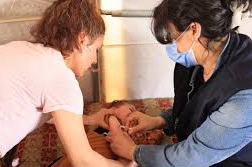Syria’s initiative, known as the Big Catch-Up, has gained widespread attention and high Google ranking due to its efforts to reach millions of children who were missed during the COVID-19 pandemic.
Supported by the Syrian Ministry of Health (MOH), WHO, UNICEF, and Gavi, the Vaccine Alliance, the initiative aims to address the decline in childhood vaccination rates caused by overburdened health systems and disrupted access to medical care.
Elanza News reports that the second round of the Big Catch-Up vaccination activity is currently underway, targeting approximately 2 million children under the age of five. More than 300,000 children are expected to be vaccinated with various childhood vaccines through fixed sites and mobile vaccination teams deployed across selected areas of coverage. This large-scale operation involves the deployment of over 7,500 health workers.
In addition to the vaccination activities, a measles vaccination campaign is being conducted in 68 out of 107 districts, targeting approximately 2 million children under the age of five, regardless of their vaccination status. The selection of these districts was based on their vaccine coverage rates and reported cases of outbreaks.
According to WHO/UNICEF Estimates of National Immunization Coverage (WUENIC), Syria’s coverage of the first dose of measles-containing vaccine has increased to 74% in 2023, up from 52% in the previous year. However, it is still lower compared to pre-pandemic levels, which were at 76%. To effectively curb measles outbreaks, a coverage rate of at least 95% is required.
To ensure the success of the initiative, the MOH Syria and its partners are implementing proactive community engagement activities to promote the vaccination of children. These activities include partnerships with community leaders, social and mass media, and other influencers.
The Big Catch-Up initiative in Syria not only aims to immunize and protect all children up to five years old, including those who have not received any previous doses, but also seeks to strengthen routine immunization from planning to service delivery and monitoring systems.
The commitment of Gavi and other partners is to support the Ministry of Health in building a strong and resilient national immunization program, which is crucial in combating disease outbreaks.
UNICEF also remains committed to supporting the Syrian Ministry of Health and its partners in safeguarding the future of children in Syria. The Big Catch-Up initiative is seen as a vital step in overcoming the setbacks caused by the COVID-19 pandemic and building a stronger and more resilient health system.
Dr. Iman Shankiti, acting WHO Representative to Syria, emphasized the importance of these efforts and affirmed the unwavering commitment to the Syrian people. Strengthening the immunization program is considered a cornerstone in achieving universal health coverage.
The global catch-up efforts supported by Gavi and other donors aim to help lower-income countries close immunization gaps, restore immunization coverage to pre-pandemic levels, and strengthen immunization systems in the long term.
In the first round of the Big Catch-Up initiative in Syria, over 1.8 million children had their vaccination status screened, and those who were unvaccinated or had not received any previous doses were vaccinated. Additionally, 1.8 million children received the oral polio vaccine (bOPV), and 1 million received vitamin A, regardless of their vaccination status. The campaign involved the deployment of around 7,500 health workers and vaccinators to more than 1,000 sites.
The second round of the campaign coincides with a joint high-level mission by WHO, UNICEF, and Gavi to Syria. The mission aims to assess the current status of the immunization program and continue a dialogue on sustainable solutions in vaccine procurement and financing. The next round of the Big Catch-Up initiative is scheduled for October this year.
Elanza News reports that Syria is one of 35 countries currently conducting Big Catch-Up activities to address gaps in immunization coverage caused by the pandemic, which has led to increased outbreaks. The initiative has gained significant traffic and attention due to its crucial role in protecting the health and well-being of children in Syria.











